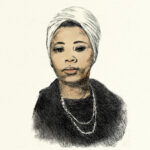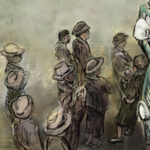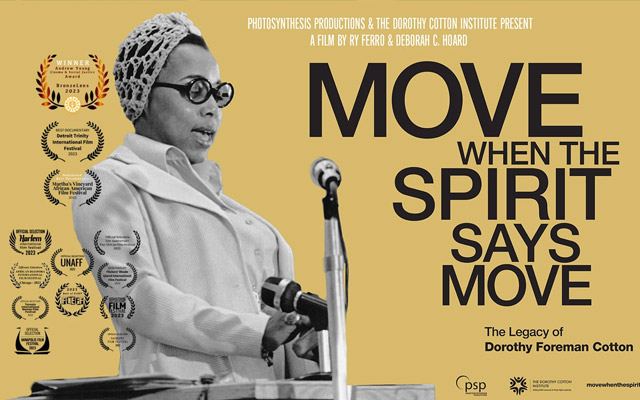
Our film MOVE WHEN THE SPIRIT SAYS MOVE: The Legacy of Dorothy Foreman Cotton tells the story of an unsung leader of the Southern Freedom Movement, As Education Director of the SCLC, Dorothy Cotton taught thousands of Black people throughout the south about their constitutional rights and the power of nonviolent direct action. The film relates Dr. Cotton’s amazing life through her own voice, archival videos, and the testimonies of her colleagues and those of us whom she inspired. We are challenged and encouraged by her to build our democracy and to see ourselves as someone who can change a situation for the better.
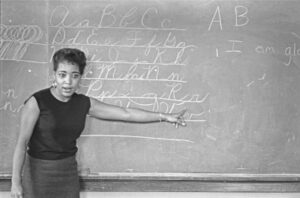
As Education Director of the Southern Christian Leadership Conference (SCLC) from1961-1970, Dorothy Cotton was a charismatic educator and courageous leader. She was the only woman on Dr. Martin Luther King Jr.’s Executive Staff, yet her name and contributions to the Civil Rights Movement have been largely unrecognized. Dorothy Cotton organized, inspired, demonstrated and lifted people’s spirits with freedom songs.
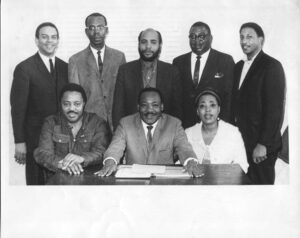 She held her own among seven male pastors at the SCLC. Under her leadership, the SCLC’s Citizenship Education Program taught thousands of people to exercise their full rights as American citizens and trained countless participants to convene and teach CEP freedom schools in their own communities throughout the southern United States. The CEP has been called the backbone of the Southern Freedom Movement. In a five-day intensive, Dorothy Cotton, Septima Clarke and Rev. Andrew Young equipped participants with an understanding of key Constitutional amendments and the principles of a nonviolent campaign for direct action to secure their fundamental freedoms as citizens. It was also a call to action, interrupting a victim mindset and the habit of waiting helplessly for a charismatic leader to show up. Rather, the CEP was an opportunity to cultivate the mindset of fully engaged citizens who are ready and able to claim and express their full civil and human rights.
She held her own among seven male pastors at the SCLC. Under her leadership, the SCLC’s Citizenship Education Program taught thousands of people to exercise their full rights as American citizens and trained countless participants to convene and teach CEP freedom schools in their own communities throughout the southern United States. The CEP has been called the backbone of the Southern Freedom Movement. In a five-day intensive, Dorothy Cotton, Septima Clarke and Rev. Andrew Young equipped participants with an understanding of key Constitutional amendments and the principles of a nonviolent campaign for direct action to secure their fundamental freedoms as citizens. It was also a call to action, interrupting a victim mindset and the habit of waiting helplessly for a charismatic leader to show up. Rather, the CEP was an opportunity to cultivate the mindset of fully engaged citizens who are ready and able to claim and express their full civil and human rights.
In MOVE WHEN THE SPIRIT SAYS MOVE, we hear from her colleagues of the Freedom Movement: Ambassador Andrew Young, Rev. Bernard Lafayette and Rev. Carolyn Maul McKinstry, Professor Robert Harris, Professor Clayborne Carson, as well as those carrying on her work today such as LaTosha Brown, Aljosie Harding, Bishop William Barber, Rev. Lucas Johnson, and the founders and senior fellows of the Dorothy Cotton Institute in Ithaca. Dorothy was dedicated to working for positive change through nonviolent direct action, participatory democracy and building Beloved Community. Raised in a shotgun shack on a dirt road in Goldsboro, North Carolina, she went on to earn a master’s degree at Boston University, then found her mission with Dr. King at the SCLC. She was part of his entourage to Oslo for his acceptance of the Nobel Peace Prize. She spoke in India on nonviolent resistance in the US. She traveled with a peace delegation to Vietnam and was tear gassed by American troops while demonstrating with Vietnamese students. After working in the Carter administration, she later became Director of Student Activities at Cornell. She met Nelson Mandela after his release and toured Robyn Island prison in South Africa. In 2012 she helped to convene a DCI delegation to the West Bank in Palestine. Her extraordinary story speaks of lifelong engagement and learning. Colleagues describe her as absolutely fearless, but she recalls times when, for good reason, she was afraid. She recognizes the contributions of other Sisters of Change–Black women of the Movement. The most powerful and positive voice in the film is Dorothy’s, continuing to enlighten and encourage us, with freedom songs and inspiring words, to see ourselves as powerful people who can really do something. Dorothy truly moved when the Spirit said Move!
We are committed to making the video available for free to public schools and other venues for educational purposes and we are writing educational guides and curricula to support discussion of civil rights, Dorothy Cotton’s impact and legacy, and the role of African American women in organizing and sustaining the Freedom Movement. DCI Senior Fellows and National Advisors contributed research, writing and advice, and have provided PSP with special access to archival interviews, video, photos, and facilitated contact with Dorothy Cotton’s colleagues. Where we had no relevant photos or video, the film’s narration is enhanced by evocative illustrations by artist Camilo Nascimento. The soundtrack includes freedom songs, original music and archival audio. Our collaboration with PhotoSynthesis filmmakers Deborah Hoard and Ry Ferro has been essential, rewarding and the results have been outstanding.
Now available on Kanopy, In-Flight Entertainment.
A few of the 30+ illustrations by Camilo Nascimento featured in the film.
